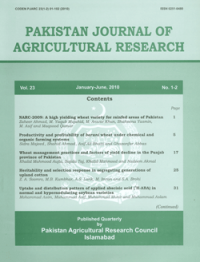PROMOTING CERTIFIED SEED AVAILABILITY OF WHEAT (TRITICUM AESTIVUM L) THROUGH PUBLIC-PRIVATE PARTNERSHIP AND ITS IMPACT ON YIELD IN RAINFED AREAS
Muhammad Tariq*, Raja Muhammad Omer**, Muhammad Ashraf Mian*, Obaid Ur Rehman***, Amjad Tahir Virk and Kazim Abbass**
ABSTRACT
The use of poor quality seed results in poor crop stand and eventually in lesser vegetative growth leading to poor crop yield. Hence, it is the need of the time to enhance provision of certified seed of improved varieties to the farmers. An approved wheat variety 'Chakwal-50' of rainfed areas was selected for certified seed production and distribution in rainfed District Chakwal under joint venture of a study on comparison of seed source(Certified vs. Farmer's seed) contribution towards wheat yield at six sites in the District. All the agronomic practices were the same in both -2 treatments. The number of fertile tillers m were significantly higher in certified seed source than the farmer's own seed that resulted in significant increase in grain yield. Other yield contributing parameters including number of spikelet per spike, numbers of grains per spike and 1000 grain weight were at par in both seed sources. It was concluded that healthy and pure seed source gave high seed germination and good crop stand which enabled the plants to withstand abiotic stress especially drought during the crop season. The seed multiplication of crop varieties of rainfed areas can be done in irrigated areas to ensure the quality of seed and its availability in rainfed areas, which ultimately will increase the income of the farming community of the area.
To share on other social networks, click on any share button. What are these?







